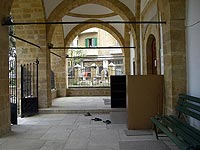 |
the north cyprus travel guide |
 |
|
Arabahmet (Arap Ahmet) Mosque
The Arabahmet Mosque is a modest building set amongst trees and an immaculate garden in Arabahmet district in North Nicosia. (The garden is a lovely quiet and cool place to sit if you want to escape from the heat and bustle of the city for a while on your North Cyprus holiday!) For once, the mosque is not a converted church, but a purpose built mosque, named after one of the commanders of the 1571 Ottoman army. The building is square with a dome on top, and a single tall minaret. Much Loved, Much Restored: The Arabahmet Mosque in North NicosiaThe 18th century building was first restored in 1845 and extensively restored in the 1990s, and inside has the distinctive modest interior decorated with carpets on the floor and a green pulpit. The carpets in fact hide a building secret; large tombstone slabs from the graves of Frankish knights have been reused in the floor from the church that originally stood on this site. The slabs include a tombstone for Louis de Nores, dated 1369. Tombs and Relics at the Arabahmet Mosque, North NicosiaThe mosque is said to hold a relic of the Prophet, a hair from his beard, which is shown to the faithful once a year. The tomb of Kamil Pasha is also here, honouring the only Cypriot ever to become grand vizier of the Ottoman Empire. Kamil was born in Nicosia in 1832, and was actually Grand Vizier no less than four times during his life. He died in Nicosia in 1913 and was buried in the mosque courtyard. His tomb was constructed in 1927 on the orders of Sir Ronald Torss, the Governor of Cyprus. The garden features tombstones of departed pashas, the gleaming white marble being originally brought to North Cyprus from Beirut. |
|
North Cyprus quick: holidays | flights | hotels | property | kyrenia | famagusta | photos | map | weather | history | news
All text is copyrighted by Cyprus44. Photographs are copyrighted by their respective photographers.
For more information read our copyright policy, privacy policy and disclaimer.
This web page is served on 18 September 2025 at 5:01:35 PM.
![]()
Cyprus44 in other languages: Nordzypern | Chypre Nord | Severní Kypr | Северный Кипр
partner sites: goNorthCyprus Travel | Pacific Rent-A-Car | Amy Holiday Villas | other partner sites







